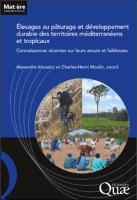Elevage au pâturage et développement durable des territoires méditerranéens et tropicaux
Connaissances récentes sur leurs atouts et faiblesses
| dc.contributor.editor | Ickowicz, Alexandre | |
| dc.contributor.editor | Moulin, Charles-Henri | |
| dc.date.accessioned | 2023-01-10T10:57:19Z | |
| dc.date.available | 2023-01-10T10:57:19Z | |
| dc.date.issued | 2022 | |
| dc.identifier | ONIX_20230110_9782759234851_6 | |
| dc.identifier.uri | https://library.oapen.org/handle/20.500.12657/60573 | |
| dc.language | French | |
| dc.subject.classification | thema EDItEUR::T Technology, Engineering, Agriculture, Industrial processes::TV Agriculture and farming::TVH Animal husbandry::TVHB Animal breeding | en_US |
| dc.subject.other | agriculture | |
| dc.subject.other | land use | |
| dc.subject.other | climate | |
| dc.subject.other | sustainable development | |
| dc.subject.other | livestock | |
| dc.subject.other | Mediterranean | |
| dc.subject.other | grazing | |
| dc.subject.other | tropics | |
| dc.title | Elevage au pâturage et développement durable des territoires méditerranéens et tropicaux | |
| dc.title.alternative | Connaissances récentes sur leurs atouts et faiblesses | |
| dc.type | book | |
| oapen.abstract.otherlanguage | Family-run ruminant pasture farms in Mediterranean and tropical territories contribute directly to eight of the seventeen Sustainable Development Goals (SDGs) of the United Nations 2030 Agenda. For a long time, these farms have been on the fringe of agricultural investment efforts. However, they have undeniable assets for meeting these SDGs in interaction with other forms of livestock farming present in the territories. However, they also face a number of constraints that call into question their sustainability. The interdisciplinary synthesis presented here aims to answer three key questions: How can the adaptive capacities of these livestock farms be strengthened to respond to climatic, social and economic changes? How can their efficiency be improved at different levels of organisation and at social, economic and environmental levels? Finally, how can these farms contribute to innovation processes for the agro-ecological transition? This book is based on research recently published by the UMR Selmet (CIRAD-INRAE-Institut Agro) on a variety of sites around the world and in a broad international partnership. It is intended for the teaching and scientific community, students, and stakeholders in the livestock sector and in the territories, working at different decision-making levels. | |
| oapen.identifier.doi | 10.35690/978-2-7592-3486-8 | |
| oapen.relation.isPublishedBy | f3266e68-be04-43a2-896c-b3499f43d67e | |
| oapen.relation.isbn | 9782759234851 | |
| oapen.relation.isbn | 9782759234868 | |
| oapen.relation.isbn | 9782759234875 | |
| oapen.pages | 210 |

